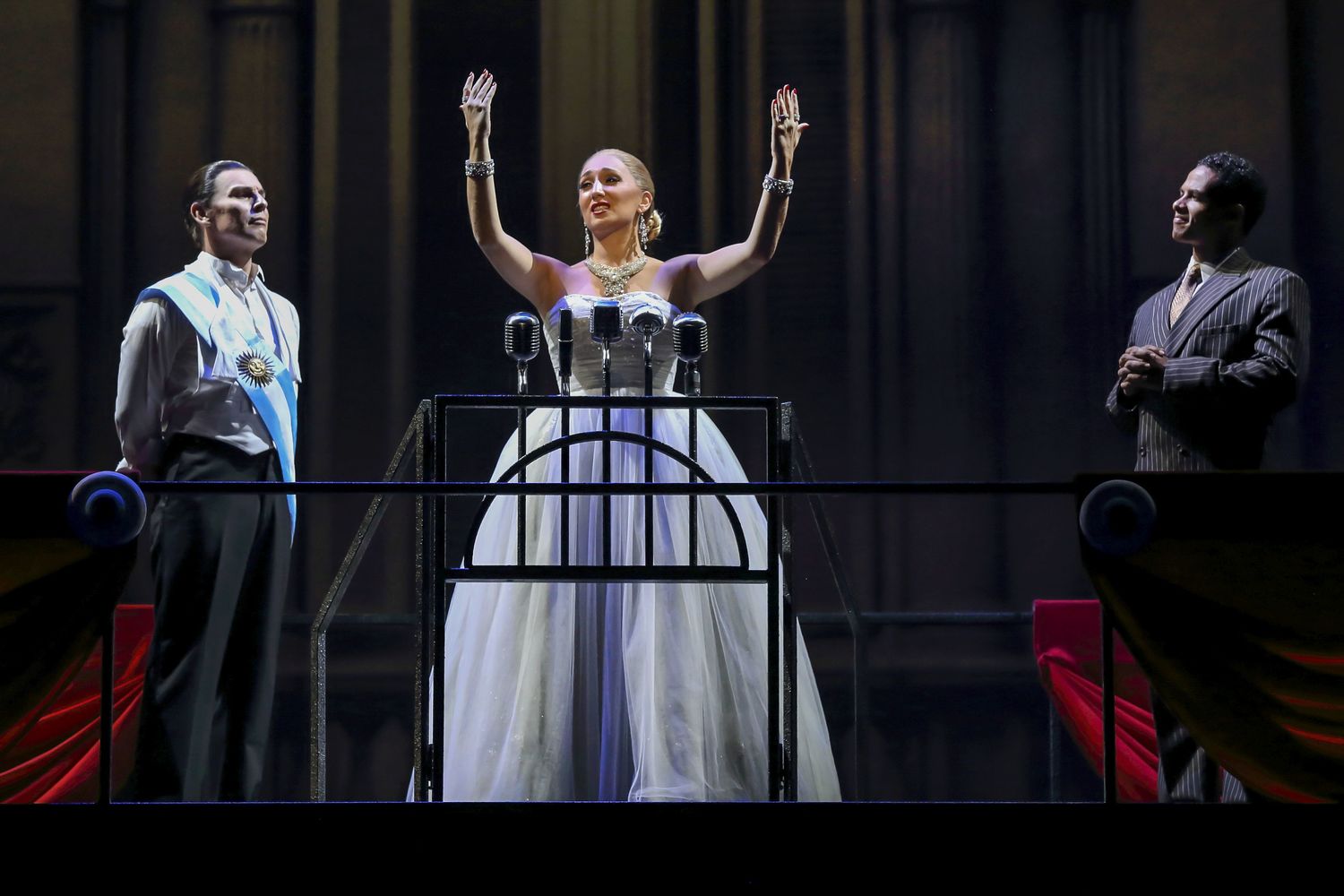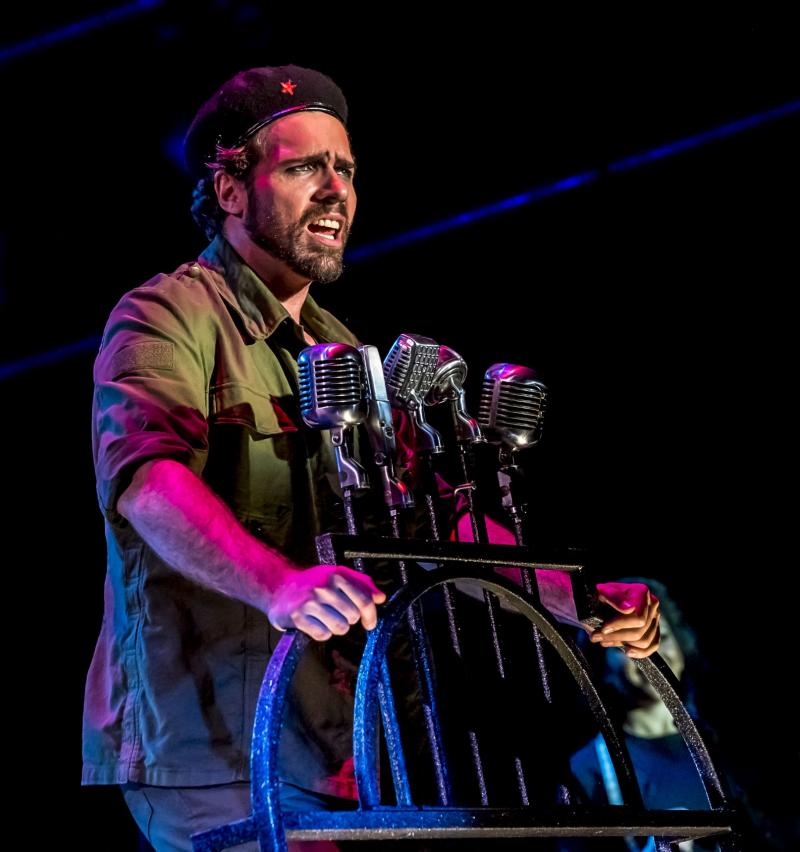Review: Brechtian Affection - EVITA at Hong Kong Academy for Performing Arts

Robert Finlayson as Perón
Photo Courtesy: Lunchbox Theatrical Productions
Hal Prince really loves Brecht. This is my first initial reaction after seeing EVITA, the revival of Mr Prince's original West End and Broadway production of the musical by composer Andrew Lloyd Webber and lyricist Tim Rice, now running in Hong Kong at the Hong Kong Acamedy for Performing Arts for its international tour with a brand new cast
I, as a Broadway musical nerd, am both shameful but also excited to not have seen the importance of this 40-year-old piece. Originally, I do not like EVITA solely by its on-page material. As a youngster, without any opportunity to see the original production of EVITA, one could only know about this musical largely through its 1996 film adaptation by Alan Parker with Madonna as the lead. I remember I watched that film and found it absolutely boring because none of the numbers done in the film is engaging with the story. Scenes are just shown with songs, but they are not driving the plot. Instead, they seem like conceptual songs trying to map out the story of Eva, resulting in developing a long film without much happens.
Even later when I listened back to the full album, I find the songs are executed rather in a non-exquisite way, as if Mr Rice is having a problem with writing songs with rhymes. Instead, he somehow just infuses simple dialogue into Mr Lloyd Webber's loosely composed music. Also, Elaine Paige's and Patti LuPone's renditions, arguably the best versions of all time, do not seem to be engaging enough for me to feel the piece.
Even for the recent Broadway revival in 2012, directed by Michael Grandage, I feel that the production is trying to make the audience to engage into Eva as a character, but the libretto just does not seem to offer much for that purpose.
That is why I had never put EVITA as a musical that I really admire. I felt that the material, as a piece of musical theatre, was not tightly written. It just sounded shallow as an art piece.
Little did I remember that EVITA was originally directed by Mr Prince, the legendary Broadway director. Of course, one has to talk about Stephen Sondheim when one talks about Mr Prince. Mr Prince and Mr Sondheim were long-term collaborators back when they first created WEST SIDE STORY in 1957 as producer and lyricist respectively. However, one ultimately wanted to direct, while the other ultimately wanted to compose. After years, they collaborated again for COMPANY in 1970, finally as director and songwriter.
It was my learning of Mr Sondheim's works that I started to learn about Mr Prince's direction as well. It is interesting to discover that Mr Prince always chooses political subjects for most of his directing projects. One cannot hide the fact that he was the director of CABARET, COMPANY, FOLLIES, PACIFIC OVERTURES, and SWEENEY TODD, all are highly political in a sense to criticise or to question a situation of the characters on stage. The common thread they share is that they are all done in Brechtian staging.

Photo Courtesy: Lunchbox Theatrical Productions
That was why I was not much of a fan of Mr Prince's work back when I was a teenager. I thought that Mr Prince was trying to make materials that were more for a black box or Studio Theatre, something that requires intimate and sensitive reading, on a big Broadway stage. I was also quite stereotypically assuming that Mr Prince, as an American Broadway director and producer, just want to make a production as big as possible. I remember I had no fond memories of watching the DVD of the original Broadway production of SWEENEY TODD with Angela Lansbury and George Hearn because I just felt the set looks so cheap and hollow for a Broadway production. The acting is also very unengaging. Again, I just did not feel anything from the characters.
That was the time when I had no knowledge of Brechtian theatre. Now, when I finally saw EVITA with Mr Prince's original direction, I finally see that he really is an expert on poor theatre and alienation effect.
Same as SWEENEY TODD, EVITA is done with a scaffolding set with no glamorous realistic aesthetics. What it has is a bare stage with subsequent props, low-key costumes, and a big blank screen attached above to show relative historical photos. The highlight of the set is actually the lights on the stage floor that forms a circle in the middle and a 'W' shape along the sides.
This is how the stage is set. There is not realism, no make-believe. It just tells you that the theatre is only a representation of the characters these actors are going to play. The audience and the actors are all in the theatre at the same time.
I find it eerie that for the whole evening, I never stop comparing EVITA's musical tropes in the opening to Brecht's THE THREEPENNY OPERA. 'Requiem of Evita' resembles THREEPENNY's overture, then Che (Guevara or a character sharing the same name with the same political philosophy)'s 'Oh, What a Circus', commenting on Eva's whole life as a show finally ends, sounds similar to the purpose of 'Mack the Knife', introducing the lead character of this play. Che also asks (us audience) who is this person the Argentines are mourning so crazily as if she was their saviour. However, the mocking from Che on Eva is vivid. To say 'Oh, what a circus' is to mock Eva's political life as a circus, a show which the people of Argentina falsely believe in. Eva is a saint to the people, but is she really a saint? Che ends with speaking to Eva, 'You let down your people', explicitly declares his point of view.
With only this opening number, the tone of the musical is already set. The theatre is not a place to escape anymore but a forum for us to look at Eva as a person, and how should we judge her critically.
.jpg)
Photo Courtesy: Lunchbox Theatrical Productions
Thus it becomes a nearly two-hour show with numbers that are mostly commenting on the characters, some by Che as a narrator or by the characters themselves, rather than to sing for the plot. Based on Brecht's theory of opera, songs are all sung by actors directly to the audience by breaking the fourth wall. Actors should alienate themselves from the story completely.
And this is done in EVITA for most of the numbers. So different from Mr Grandage's realistic approach, Mr Prince's original idea is to make EVITA a satire on politics. I finally know why the libretto is written in such a disjoint manner, why Mr Rice writes the lyrics in such plain-speaking terms, and why I was not emotionally engaged with the songs because they are not supposed to. They are songs that require the audience to listen carefully so we can have a rational thinking about Eva, about Perón, and also about Che and the Argentines. I finally know the purpose of 'Another Suitcase in Another Hall', the purpose of its significant Brechtian moment when the mistress turns to the audience and sings about her situation and her concerns about her future. It is not a song for the audience to sympathise the mistress, but to think about the moral justification of Eva through the mistress's voice.
In return, I was engaged in the debate between Che's perspective of Eva, condemning her actions of being a hypocrite, and Eva's own arguments of why she has to be such a two-faced person. The audience was supposed to follow Eva's life story, rooting for her to leave poverty, becoming big as an actress, and then finally becomes the first lady of Argentina. 'A New Argentina' is as epic and blood-boiling as 'One Day More' in LES MIS, having Argentines coming forward on the stage, supporting Eva and Perón as their new leaders to lead them a brighter future. It is full of emotions for an Act 1 finale.
Yet, we also see the crookedness of Perón as a politician during the number of 'The Art of the Possible' which the audience sees how Perón rises to power. The big screen shows horrific historical photos of riots and assassinations, while on stage, the elimination of powers is done through musical chairs, a childish game. They sing about politics as an art of the possible, something that is positive. However, we can also see that for one to rise to power needs to sacrifice civilian lives. Another Brechtian method for the audience to alienate themselves from the story and think about the moral (or the amoral nature) of politics.
With this, 'A New Argentina' is not a number to exudes revolutionary vibe and affects the audience's emotion. Instead, one will be haunted by the schemes Eva and Perón are plotting, even though it seems that their purpose is for the people.
These moments of mixed feelings just keep coming up, with numbers like the famous hit 'Don't Cry for Me Argentina' which exudes emotions to believe Eva's honesty, but just for a short period when Eva and Che sing 'High Flying, Adored' right after that, having Che commenting on Eva climbing up high, telling her to be careful that she will fall eventually; or 'And the Money Kept Rolling In' which Che mocks Eva for setting up the Foundation Eva Perón for the poor while the couple is not keeping books honestly.
.jpg)
Photo Courtesy: Lunchbox Theatrical Productions
All these numbers, originally unengaging when I listened to them in the recording or watching them on film, suddenly becomes so riveting and meaningful. One will start and listen to their arguments, and then slowly having catharsis in the ending, not because of Eva's death but because the situation it has become. One will ask who should I root for? Eva, Che, Perón, the Argentines, or actually none of them? History seems to have always repeated itself, and EVITA, as a Broadway musical, actually has exceeded its mission as an Epic Theatre that is not to entertain but for us to think.
And that is why I am so glad I finally have seen Mr Prince's EVITA, especially in live because I do not think one can experience Brechtian theatre fully without being there. It is because of Mr Prince's production that I give EVITA more credit than I did before. I think Mr Rice's lyrics, under this context, is understandably adequate. Mr Lloyd Webber, though he is not Kurt Weill, composes music that is hummable and unforgettable, mainly because now I care about these songs.
That said, what is the verdict for this international tour of this iconic original production of EVITA? I say it is good. Not great, but good. The night belongs to Emma Kingston and Jonathan Roxmouth as Eva and Che, both express exuberant vocal kills and sultry charm. One might say this whole company lacks presence comparing to others of the same production. It is definitely that, especially Ms Kingston whose Eva can be more animated. However, under the context of alienation effect, I do think the company has done quite a job to make me aware of their presence without being overblown solely by their performing skills. Afterall, Brechtian theatre is ensemble work, not a star vehicle.
EVITA at the Hong Kong Academy for Performing Arts
Through 10th June 2018
Tickets: HKTicketing
Videos
